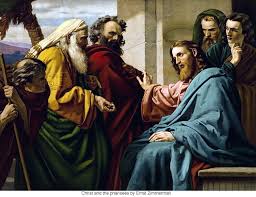
Suppose a friend from out of town calls and says she will stop by to visit you in two days. What would you do? If you are like me, you’d launch an emergency clean-up “campaign.” Out of the closet would come a bucket, a vacuum cleaner, furniture polish, dust mop, and clean towels. We want to give the impression to our friend that we are clean and orderly, even though things are usually messy around our houses.
Cleanliness has become an important value in our society.
This is nothing new. Apparently, cleanliness was so important in Jesus’ day that it had become equated with religious practice. When someone did not live up to cleanliness rules, they were considered on the outs with God. Today we read about an incident in which Jesus’ disciples did not live up to religious rules (Mark 7:1-13).
“When the Pharisees with some scribes who had come from Jerusalem gathered around Jesus, they observed that some of his disciples ate their meals with unclean, that is, unwashed, hands. (For the Pharisees and, in fact, all Jews, do not eat without carefully washing their hands…And coming from the marketplace they do not eat without purifying themselves. And there are many other things that they have traditionally observed, the purification of cups and jugs and kettles and beds.)
As I understand this, there were religious rites connected with their washing. It wasn’t a matter of going to sink and splashing some water in one’s face or tossing the cups, jugs, and kettle in the dishwasher, or putting clean sheets on the bed. We wonder how much of their time was spent in “cleaning up” themselves and their belongings. A religious person was a ritually clean person.
“So the Pharisees and scribes questioned him, ‘Why do your disciples not follow the tradition of the elders but instead eat a meal with unclean hands?’ Jesus responded, ‘Well did Isaiah prophesy about you hypocrites, as it is written: This people honors me with their lips, but their hearts are far from me; in vain do they worship me…”
A hypocrite was an actor. These people were giving the impression that they were outstanding religious people; inside, however, they were at odds with God.
Jesus continued:
“You disregard God’s commandment but cling to human tradition. How well you have set aside the commandment of God in order to uphold your tradition.”
In effect they were saying, “Get out of the way God, we set the rules around here.” They were so mixed up that they believed that by obeying human tradition they were pleasing God and earning their way to heaven. Jesus said,
“You nullify the word of God in favor of your tradition that you have handed on.”
Imagine the pride that motivated these leaders. They considered themselves superior to God, and that their rules pre-empted God’s law. They even neglected supporting their aging parents in order to follow their “human tradition.”
We can understand why Jesus was so upset with these people. They were meticulous in their outward observance, but their hearts were “filthy dirty.” They had been brainwashed into thinking that God was pleased with them and their catalog of purification rules.
Though we no longer regard such cleanliness practices as religious rules, we still put a high value on cleanliness. It is not just a matter of protecting ourselves from germs; it is often a matter of impressing others who may identify cleanliness with being a good, upright person. Do we put as much effort and intention to inner cleanliness?
We are blessed in our Church with rites that really do have the power to clean us—not on the outsides, however, but on the insides. We have been washed clean in the life-giving waters of baptism, purified with the cleansing blood of Jesus at Mass, and made right with God through the sacrament of Reconciliation. God offers us “products” that have the power to heal us deep within our hearts. Let us give at least as much attention to God’s works as we do to human tradition.
